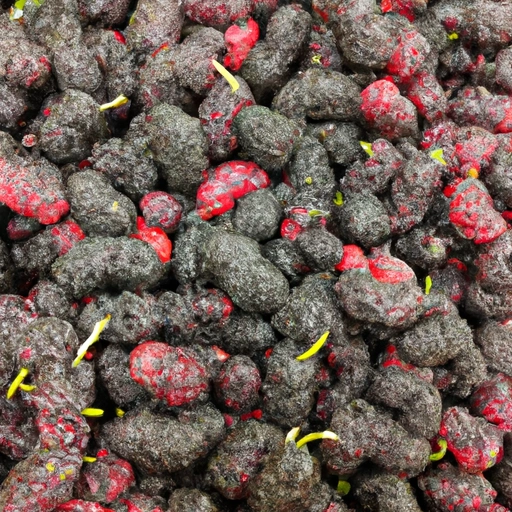Mulberry
Description

Mulberries are the sweet, hanging fruits from the mulberry trees, scientifically known as Morus. These berries are not only delicious but also highly nutritious, with their usage spanning various cuisines and preparations around the globe. Different species are more common in different regions, such as Morus alba in Asia, Morus nigra in Europe, and Morus rubra in North America.
Common uses
Mulberries are commonly used both fresh and dried, enjoyed as a snack, and employed in a variety of culinary applications, including jams, pastries, smoothies, and as a natural sweetener.
Nutritional value
Calories
A 3.5-ounce (100-gram or just under 1 cup) serving of fresh mulberries contains approximately 43 calories (180 kilojoules).
Protein
This serving size of mulberries provides about 1.44 grams of protein.
Fat
Mulberries are low in fat, containing just 0.39 grams per serving.
Carbohydrates
With about 9.8 grams of carbohydrates, mulberries offer a healthy energy source.
Vitamins
Mulberries are rich in Vitamin C and also contain Vitamin K, Vitamin E, and B-complex vitamins, including thiamin, riboflavin, and niacin.
Minerals
These berries are a good source of iron, potassium, magnesium, and manganese.
Health benefits
Consuming mulberries may support immune function, improve digestion, and aid in the control of blood sugar levels. They are also associated with skin health and anti-aging effects due to their antioxidant content.
Potential risks
While mulberries are generally safe for most people, they may cause allergic reactions in some individuals. Those with diabetes should also monitor their blood sugar when consuming sweet fruits like mulberries.
Common recipes
Mulberries are featured in recipes such as pies, tarts, wines, cordials, and teas. They are also popular as a topping for cereals and yogurts.
Cooking methods
Fresh mulberries can be used as they are, while dried mulberries might be rehydrated or used directly in baked goods.
Pairing with other ingredients
Mulberries pair well with other fruits, nuts, dairy products like cheeses and creams, and even with some savory dishes like salads and meat glazes.
Summary
Mulberries are a versatile and nutritious fruit that can be used in a multitude of culinary applications. With historical roots in Asia that have branched out across the globe, these berries provide an array of health benefits and can be incorporated into dishes both sweet and savory. Recognized for their sweet flavor and nutritious profile, mulberries continue to be a cherished ingredient in kitchens worldwide.